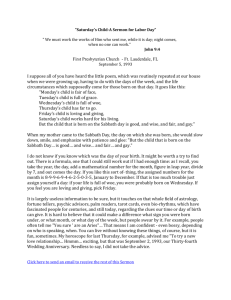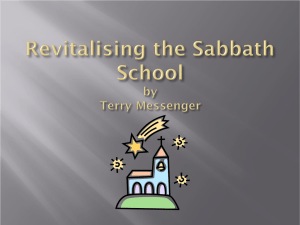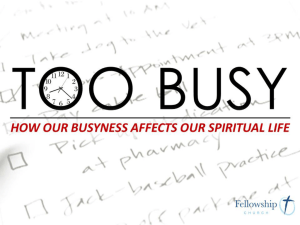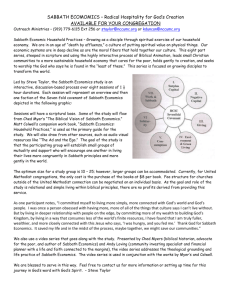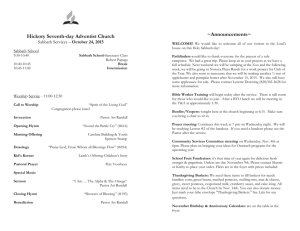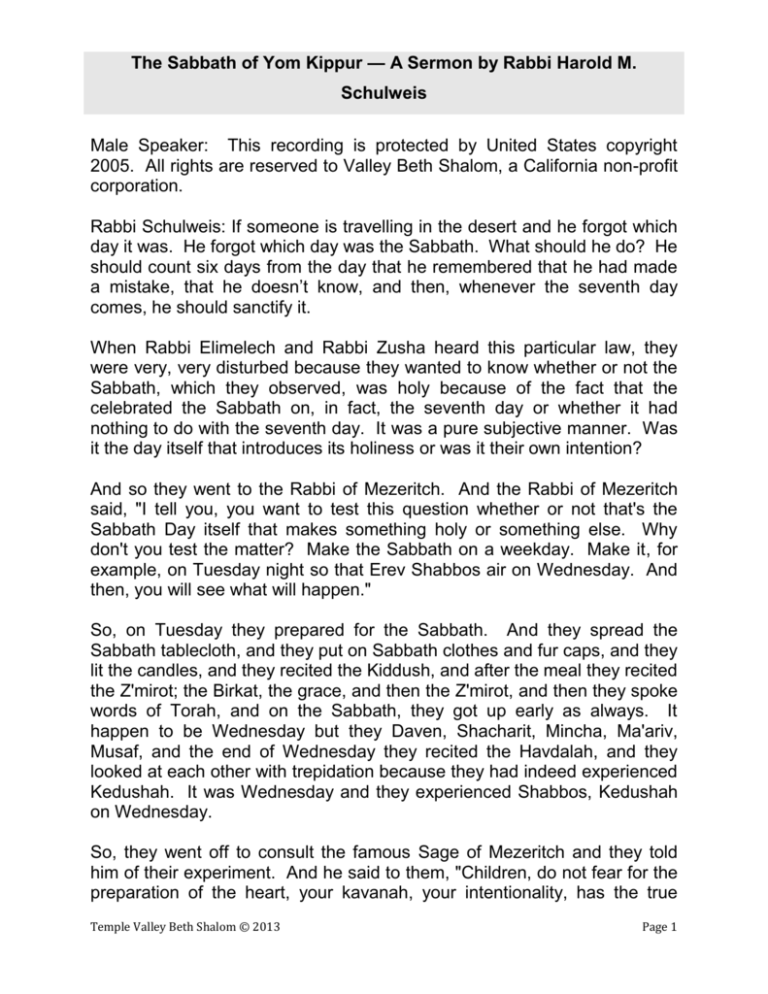
The Sabbath of Yom Kippur — A Sermon by Rabbi Harold M.
Schulweis
Male Speaker: This recording is protected by United States copyright
2005. All rights are reserved to Valley Beth Shalom, a California non-profit
corporation.
Rabbi Schulweis: If someone is travelling in the desert and he forgot which
day it was. He forgot which day was the Sabbath. What should he do? He
should count six days from the day that he remembered that he had made
a mistake, that he doesn’t know, and then, whenever the seventh day
comes, he should sanctify it.
When Rabbi Elimelech and Rabbi Zusha heard this particular law, they
were very, very disturbed because they wanted to know whether or not the
Sabbath, which they observed, was holy because of the fact that the
celebrated the Sabbath on, in fact, the seventh day or whether it had
nothing to do with the seventh day. It was a pure subjective manner. Was
it the day itself that introduces its holiness or was it their own intention?
And so they went to the Rabbi of Mezeritch. And the Rabbi of Mezeritch
said, "I tell you, you want to test this question whether or not that's the
Sabbath Day itself that makes something holy or something else. Why
don't you test the matter? Make the Sabbath on a weekday. Make it, for
example, on Tuesday night so that Erev Shabbos air on Wednesday. And
then, you will see what will happen."
So, on Tuesday they prepared for the Sabbath. And they spread the
Sabbath tablecloth, and they put on Sabbath clothes and fur caps, and they
lit the candles, and they recited the Kiddush, and after the meal they recited
the Z'mirot; the Birkat, the grace, and then the Z'mirot, and then they spoke
words of Torah, and on the Sabbath, they got up early as always. It
happen to be Wednesday but they Daven, Shacharit, Mincha, Ma'ariv,
Musaf, and the end of Wednesday they recited the Havdalah, and they
looked at each other with trepidation because they had indeed experienced
Kedushah. It was Wednesday and they experienced Shabbos, Kedushah
on Wednesday.
So, they went off to consult the famous Sage of Mezeritch and they told
him of their experiment. And he said to them, "Children, do not fear for the
preparation of the heart, your kavanah, your intentionality, has the true
Temple Valley Beth Shalom © 2013
Page 1
power to draw the light of the Sabbath holiness down to earth," because
Shabbos is not a matter of a luach, a calendar. It’s a matter of ruach. It’s a
matter of spirit. You have to understand that Sabbath has to be made from
which we get the expression in Yiddish, machen Shabbos. You have to
make the Sabbath because the Sabbath is not a matter of astronomy. It's
not a matter of looking out and seeing whether or not the sun set, whether
the stars has appeared. The Sabbath is the way we think, the way we
believe, the way we deal with time.
Now, I must tell you, when I was growing up in my grandfather's house
especially, the Sabbath was a wet blanket. It was a puritanical litany of
prohibited joys and prescriptions, and negations that inhibited all of the
joys, all of the spontaneity, all of the creativity, and all the fun. For me, the
Sabbath was a day in which I couldn't. I couldn't. I couldn't travel. I
couldn't play the radio. I couldn't pay a paper.
And I certainly -- and especially when daylight saving times came, it
destroyed the whole notion of the Saturday night date. See, it so happens
that I hated daylight saving time because all of my girlfriends -- I lived in the
Bronx. They were all in Brooklyn. So, it meant -- you understand how it is
wait until it's permissible. Then, they take the IRT and the BMT. But God
is good because my basherta lived in the Bronx and that's how it
happened.
But the truth of the matter is, I have often thought, why is there such a
terrible obsession with not working? Not working, never can work, as I
grew older I realized that you can't work. Not on Shabbos, you can't work
on Rosh Hashanah, on Yom Kippur, on Pesach, on Sukkos, and Shovous.
Why do you have to have so many prohibitions against work? First of all,
who wants to work? Why should there be such prohibitions? And yet, if
you have so many prohibitions, it means that people -- and that's the secret
I want to tell you about.
The secret is, that people want to work, desperately want to work. And I
don't mean simply six days. They want to work all seven days because
they're afraid of not working. And that, I suspect, is one of the things that
the bible was aware of. People are afraid of the Sabbath because slaves
are afraid of freedom. Slaves are afraid of free time. If I have free time,
what shall I fill it with? If I have free time, with whom shall I spend it?
Nothing frightens in our society, human beings more, than the day without
a schedule, without instruction, without deadlines, without orders. Of
Temple Valley Beth Shalom © 2013
Page 2
course, I know what people say because they say it to me all the time.
They complain that they don't have enough time for their family and for
their friends, but left with 24 hours of unstructured time, they are very
uneasy because freedom, Sabbath, is no joy and no release, and no
freedom.
Psychological and sociological literature is filled with evidence of this odd
phobia. The fear of weekends, of relaxation, of vacations, of retirement, of
leisure. The dread of having one day away from the office. The dread of
having a day in which Wall Street is closed produces in what many
psychologists including Sandor Ferenczi and Karl Abraham called Sunday
Neurosis. It's a sort of Shabbat Malez, and not a few psychologist have
written about the mounting tension experienced by successful people.
I know everybody talks about leisure, leisure, leisure. But if you look at the
words that we used, the etymology of the words like leisure, relaxation, and
other things, you will find that it's not -- it's highly overrated. Webster's
dictionary defines leisure as "freedom provided by cessation of activities,
engagement, or responsibility." But that's negative. What I want is activity.
What I want is engagement. What I want is involvement.
You see, there is no active verb for leisure. It can't say I'm going to leash.
It can't be done. Why can't you do that? Because leisure is a static noun.
The same thing applies to that wonderful word vacation, which, as you
know, means to vacate. It means to be empty. It means to be unoccupied,
but that's precisely the vacuum that I fear. And relaxation, the definition is
an absence or reduction of muscle retention, but that's flexivity.
Retirement comes from the word in French, retraite, which means to
withdraw leisure, vacation, retirement, relaxation. All of these things are
anxiety-provoking, to have time on your hands, to have to kill time, to be
bored. Soren Kierkegaard wrote a very interesting statement. He said,
"Boredom is the root of all evil." And we know how children go crazy when
they are bored. We are children.
Sigmund Freud called work -- I say this in reverence. He's one of our
greats. Sigmund Freud called work and love the parents of human
civilization. But in our time, it is not love, but work, that is the cheapest joy.
And I read as you have read, social psychologists who have noted that in
America, especially, people are working more.
Temple Valley Beth Shalom © 2013
Page 3
I read economist Juliet Schor's wonderful book called The Overworked
American. And she informs us that in the last two decades, the average
worker has added on an extra 164 hours a month of work to the work year.
Vacations, she writes, have shortened by 14% and parental time available
to children per week has fallen 10 hours in the white household.
So, that's not surprising. Of course, you'll say the reason that people are
working more is it's getting tougher and tougher to make a living. But the
significant thing of all of these studies is that men and women prefer to
work than to be at home. They prefer business to home.
In this wonderful book which was a bestseller for a while called The Time
Bind by Arlie Russell Hochschild, she says that there is a profound reversal
in the psyche of our times. Men and women both prefer the workplace to
the home not because the new economy demands it, not because they
need to, because they want to work. There is a competition for time
between home and the workplace, and the workplace is winning. Why?
Because work is more interesting than home, because work is more
rewarding emotionally.
In the work place in these interviews are fantastic. They all write that one
feels more appreciated in work, greater self-esteem, more camaraderie
than at home. The workplace is an escape from home. For men and for
women, the workplace is an escape from unwashed dishes, unresolved
quarrels, crying tots, and testy adolescents, and unresponsive mates.
Women report that preparing the gourmet meal, that washing and feeding
the family, in no way compares to the satisfaction, to the recognition, to the
bolstering of self-esteem, and to the respect that you receive in the office.
This is true of all people including intellectuals.
Kay Hamod, the historian, writes, "I love scholarly work because you force
a manuscript into shape. It's not like sitting alone for nine months waiting
for something to happen with you." I understand this lady. Mothering does
not yield a raise or a promotion, or a bonus, or a gold watch. Mothering
means to be yelled at, to be abruptly awakened at night, to be urinated on,
to repeatedly clean up spilled cereal, and much more. Now, I am struck by
this because I think this is something very, very intriguing about us, the
reversal of our psyches.
Yesterday, books were written with titles such as Home is the Haven from a
Heartless World. Not today. Today, it should be entitled The Office is the
Temple Valley Beth Shalom © 2013
Page 4
Haven from a Heartless World. Yesterday, we used to spoof about the
factory and about efficiency, and about speed, and scheduling. In my
youth, there was one movie that I loved more than any other. I never told
you about this. Now, I confess to you on Yom Kippur, it was Charlie
Chaplin's Modern Times. I don't know how many of you saw it. It's a
wonderful, wonderful satiric insight into the technological, industrial world of
the late 1930s.
You remember that the important thing is that you've got to save time. In
order to save time, the manufacturers, the factory people introduced the J.
Willicomb Billows Feeding Machine. The intention is that workers shouldn't
have to stop for work for lunch and for waste time. So, they were fed with a
technological device such as the revolving plate with an automatic food
pusher in your face, an automatic soup plate with a compressed air blower
so the workers wouldn't have to stop to cool the soup by blowing in it with
their lips. There was a corn feeder with buttered corn on the cob moving
back and forth horizontally. All the while, while Charlie Chaplin is having
this in his mouth, he is busy tightening bolts. And there is a sanitation
hydro-compressed sterilized mouth wiper that would keep him clean. And
all of these for the sake of efficiency.
And we laughed and we laughed, and we laughed. That was not a movie
that we'd go over today. It has to be a new movie. And we have a lot of
directors and a lot of people who are writing scripts and I want to give you
the script. Script is, the Billows Feeding machine used to hurry the worker.
But now, it’s the mother that hurries the child.
The efficiency culture of work has taken over that of the home in a
revealing advertising by Quaker Oatmeal. I have no interest in Quaker
Oatmeal. But as a working mother that feeds her child in just under 90
seconds, the smiling mother who, in the advertisement, name is given as
Sherri Greenberg, holds a four-and-a-half-year old Nicky in her arms. And
in the ad is this wonderful line, "Nicky is a very picky eater. With instant
Quaker Oatmeal, I can give him a terrific hot breakfast in just 90 seconds
and I don't have to spend any time coaxing him to eat it." And the ad
concludes, "Instant Quaker oatmeal for Moms who have a lot of love, but
not a lot of time."
This is a very important phenomenon. This is a sociologically fantastic.
Psychologically and spiritually, it's mind blowing. Time has been drained
from out of the home for the sake of the workplace so that we now have a
Temple Valley Beth Shalom © 2013
Page 5
modern technology two-minute rice, five-minute chicken casserole, sevenminute Chinese feasts, fast foods for fast love.
And Hallmark cards which really represents the real poetry. The poetry
and the mindset mass culture have now -- are now written by very
contemporary shrewd observers of a contemporary scene. There are a
number of ingenious Hallmark cards available for busy parents. One of
them is to be placed on the bed for the child. It reads, "Sorry, I can't be
there to tuck you in.” But she cared enough to get the very best. Another
card is put on the breakfast table. It says, "Sorry, I can't say good
morning.”
But ladies and gentlemen, this is the Sabbath. This is the Sabbath that
falls on Yom Kippur and it cleared that I have to talk about the Sabbath.
And now, I begin to understand the centrality of the Sabbath which I really
did not understand when I was in Masada's house. Why, for example, do
you think in the midst of the 10 commandments, right, which deal with
"Thou shalt not lust, thou shalt not commit adultery, thou shalt not covet,
thou shalt not bear false witness, thou shalt not worship other gods, is there
a fourth commandment saying thou shalt remember the Sabbath?
And tomorrow when to come to Shul to hear the Haftarah from Isaiah, it's a
remarkable statement. The prophet is saying, "What is this fast for? It's
not to bring animals. It is for something else. It's for promise and
salvation." And then it concludes with something that I never noticed. "If
you refrain," says the prophet, "from trampling the Sabbath, from pursuing
your business on my holy day, if you call the Sabbath a delight and call the
holy day honorable, if you honor it and go not to your own ways nor look to
your own affairs, nor pursue your business, nor speak thereof, then shalt
thou delight in the Lord, and I will feed you with the heritage of Jacob."
Why is the Sabbath so important to the prophetic tradition that is concerned
with morality? What is the Sabbath doing in the 10 Commandments? The
Sabbath is a cry for sanity. It's a cry for freedom from this omnivorous
monster that eats at our soul and that robs us of our family, and of our
softness, and of our friends.
Judaism is not anti-business. It never said that business is the culprit. It
never said either work or Shabbos -- that would be either/or -- no, it says
both end. It says, "Six days you shall labor and do all your work, but the
seventh day is a Sabbath unto the Lord." It pleads for some degree of
Temple Valley Beth Shalom © 2013
Page 6
independence from the store, from the office, from the culture of
commerce, from the adulation of commodity, from frenetic restlessness.
It doesn’t say that you should not work. It simply says, "One day, I want
you to ask for a truce, an armistice for the sake of your liberation."
Because your calendar is the most important thing. You know what the
very first law -- and again, I didn’t know this until I saw it this way -- the very
first law that is given in the Book of Exodus for the slaves who are freed is
to make for themselves a calendar because slaves have no calendar of
their own. Only free men can have a liberated time.
There are invisible chains which have surreptitiously embraced us in the
culture of the workplace. And that culture is a culture, and it's a tough
culture. It's a hard culture. It's a competitive culture. And it's not easy, and
understand it very well, to work that hard and to be so ambitious, and then
to come home and suddenly to become a pussy cat, a sweet lovable
individual. The seduction of work has drained us of our poetry, of softness,
of intimacy, and of joy.
In this same psychologists whom I've read that deals so much with the
question of work, they write that for tens of thousands of people, this kind of
enslavement to the ambition of work produces in people anhedonia. It's a
wonderful phrase. Anhedonia. It means the inability to rejoice with the joys
of intimacy.
The obsessiveness of work, of career, of success, has brought a terrible,
terrible trice upon us and the Sabbath is a cry for Mishpocha, for the
resurrection of the family, because the modern table is filled with food and
delicacies, and drinks, but it is bare of laughter, and of song, and of
conversation. The contemporary family eats less and less together, less
and less time is spent, sings less and less, prays less and less even on the
Sabbath.
Now, when I talk about the Sabbath, I'm sure you think, "Rabbi is going to
come up with, "Why don't you keep Shabbos? Why don't you put on
candles? Why don't you do the Kiddush?" The Sabbath is not just a
matter of ritual. It is a matter of relationship. This is not simply a rabbi's
plea for more ritual. Because when you light candles or you recite the
Kiddush with a challah, more is asked for you than to know the words and
to know the words, and to know the motions.
Temple Valley Beth Shalom © 2013
Page 7
When the table talk is business and talk of business, and of making of
deals, and of the killing in the market, then the challah turns hard and dry.
These two loaves of challah are there for a purpose. Not to make the
bakery richer. There are two loaves there because on the Sabbath, the
people who are gifted with manna from heaven, so that on Friday they had
twice as much loaves, so they would not have to go out into the field and
work on Shabbat. But the people did no listen that they hoarded it, they
multiplied it, and those who gathered more than they needed, the manna
would rot. And the manna bread worms, "vayarum tolaim vayivash."
So, the two loaves of the Challah are made for you to pay attention to each
other, to have a conversation, and have a certain kind of a talk. I don't
mean the kind of talk that I hear reflected in the television sets that you
hear in the situation comedies, the same family situations. They're always,
whether is Roseanne, or whether it's married with/without children,
whatever it is, whatever the program is, they are full of wise cracks. They
are full of the demeaning, the deprecation. It's full of one's downmanship.
When the table talk speaks of children and ask them only about their
grades and their marks, and their tests, and then registers disappointment
and criticism, but speaks nothing to the child about his or her dreams or
hopes, if that happens, then the Kiddush, no matter how sweet the wine,
turns sour. Shabbos is for love. That's what it's for. It's for love.
Look at my tradition. "He shall not kindle fire throughout your habitations,"
say the Rabbis. To kindle fire doesn't mean to kindle fire? It means you
shall not have rage in your heart. You shall not have anger in your heart. It
means you shall not shout to each other. The Sabbath is a call for balance,
for homeostasis, for equilibrium. It's a modest call to correct. We're going
crazy. We're going nuts.
One day out of seven, create a fence, a wall, a barrier to keep out the
culture of business and its toughness, and its hardness, and its
shrewdness. The word Shabbos means one thing. It means stop. It
means close your pocketbook. One day out of seven, liberate "In God we
trust" from the dollar bill and put it into your life. One day out of seven put
aside your wallet.
One day in seven halt the machine. One day out of seven, leave
commerce outside of your life. Do not shop. Do not go to the beauty parlor
because you want a different kind of permanent wave than that which is in
your hair.
Temple Valley Beth Shalom © 2013
Page 8
One day out of seven, fellow computer experts, disconnect your fax and
your email, and your computers, and your internets, and www.com, and
start communicating with those you love. Don't just squeeze that mouse.
Hug your children. Is it harder? You bet it's harder. Just once, one day
out of seven, don't download. Uplift.
One night out of seven, you turn off your television set not as a
punishment, but that you can learn to look at each other. Look at your wife.
Look at your husband. Look at your children. Listen to their sounds. One
day out of seven, don't act so tired that you have no patience to talk to
each other, that you have no patience to listen and to love body and soul,
physically and emotionally.
Are we so trapped, dear friends, that only others can entertain us? Are you
lost without Oprah? Are you lost without Leno and without Letterman?
Have you no [inaudible][0:29:52] in yourselves? Can you not entertain
yourselves? Can only celebrities sing and not you? Are we so empty that
we cannot entertain ourselves even for one day?
Dear friends, it's an addiction. Sabbath is a challenge to the deepest
addiction. An addict is somebody who can't say no, who can't break the
compulsion. The world of the business, the world of -- has different talents.
However refined, the culture of the work is full of aggression. Listen to the
vocabulary. Listen to the metaphors that we use. I made a killing. Wow.
He worked him over. He gave him the business. I love sinking my teeth in
it.
The very interesting section the bible says, "You shall not pursue business
on the Sabbath nor speak of this." So, the Talmud asked, "So, what can
you talk about?" What's there less to talk about? And here's what they
say. This is in the Shabbat 150a. Gomorrah says, "One may determine
charity grants to the poor on the Sabbath.
One may supervise matters of life and death, of communal urgency on the
Sabbath. One may go to the synagogues to attend to communal affairs on
the Sabbath. One may make arrangements on the Sabbath for the
betrothal of young girls and one may provide elementary education of a
child, and teach him a trade on the Sabbath. For when Isaiah said, "Nor
finding your own affairs nor speaking your own words," this means
"Heftzecha asurim. Heftzay shamayim mutarim." The affairs of heaven are
permitted. It's your business affairs that are forbidden."
Temple Valley Beth Shalom © 2013
Page 9
The Sabbath is for Teshuvah and the rabbis love this word, Teshuvah, Taf,
Shin, Vav, Bet, Hei, which, if you turn the letters around, makes out
Hashabbat because you can create a world, you can form our own world,
you can transform your own lives because on the Sabbath, you can
become sane again.
Is it so -- forgive me if I make these statements. Is it so heroic to say that
"You know, I'm going to come home earlier on Friday night with some
flowers"? Is it so heroic to silence the ubiquitous beeper? Is it so strange
that a Havurah, which is the group of families, should not decide perhaps to
meet once a month to celebrate the Sabbath with our children and our
grandchildren in food, in song, in prayer, in friendship?
When you leave the Shul tonight, you don't have to rush you out. Don't go
too fast because you will find somewhere -- I have looked at it and your
hopefully musician was there. We have prepared for you a wonderful tape.
We means, Cantor Fox, me, Rabbi Feinstein, Jay Levy. We prepared the
tape from the beginning of the lighting of the candles to the end of the
Havdalah with commentaries.
And you will hear wonderful voices. The good voice belongs to Hershel,
but in the background, you will hear that we were so inspired when he
began to sing Z'miroth that we joined him. That's a wonderful tape and it's
for you. It's our gift. But that's not to please going to do it, but the way,
because it's going to tell you how to do the Kiddush, what the words that'll
be translated, there's also a little transliteration, there's a whole pamphlet,
but you're going to have to do it.
Dear souls, I tell you a story that always has meant a great deal to me.
Rabbi Eizik, the son of Yechiel of Krakow, after years of poverty dreamed
that there was a treasure. The treasure was in Prague. It was under a
bridge which leads to the king's palace. And when the dream repeated
itself over and over again, he took did Rabbi Eizik his shovel and began to
dig.
And the captain of the guard in Prague asked him what he was doing there.
And Eizik told him the dream. Then, the Captain laughed. "This is funny. I
also had a dream and my dream was to go to Krakow to dig up a treasure
under the stove of a man called Rabbi Eizik." And Eizik heard the captain
and understood, and he went home to Krakow, and he dug up the treasure
from under the stove."
Temple Valley Beth Shalom © 2013
Page 10
And we, dear friends, are looking for treasures. We are looking for
panaceas. We are looking for salvation. We are looking for therapy in
somebody else's territory, in other faiths, in other traditions, but it's here.
It's here where you live and where you stand. And when you leave the
synagogue, it's in your homes. There's a treasure there. Take back control
of your life. Don't let the workplace drain you of your humanity. Don't let
success, career -- and I speak not to you, I speak to me. All of these talks
are autobiographical. The Sabbath is your time. The home is your place.
The treasure awaits your discovery. Don't look too far. Shabbat Shalom.
Good Shabbos.
Temple Valley Beth Shalom © 2013
Page 11

